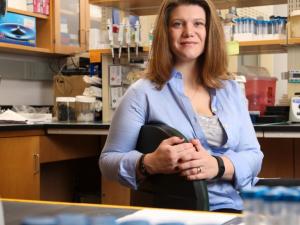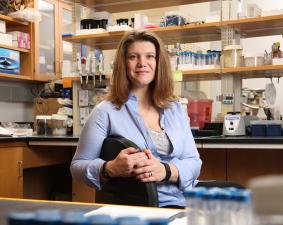Kimberly A. Kelly, Ph.D.

About
Kimberly Kelly uses computational methods and bioinformatics to develop more effective and less toxic cancer drugs through the identification of disease-relevant druggable targets, with a special emphasis on translation to the clinic and commercialization. Dr. Kelly received her Bachelor’s degree in Chemistry from Hamilton College in upstate NY, and her PhD from the University of Utah under the guidance of Dr. David Jones, PhD. Her thesis was using genomics and proteomics-based approaches to develop diagnostic reagents for colon cancer. After obtaining her PhD, Dr. Kelly took a postdoctoral fellowship position at the Center for Molecular Imaging Research at Massachusetts General Hospital (MGH), directed by Ralph Weissleder, under the guidance of Jennifer Allport Anderson. Under Dr. Allport Anderson’s guidance, Kim developed a VCAM-1 targeted imaging agent and was able to monitor VCAM-1 expression in mouse models of atherosclerosis. Further, she described a new interaction between VCAM-1 and SPARC that facilitates efficient leukocyte trafficking. In 2004, she was promoted to instructor of Radiology, and in 2008 to Assistant Professor of Radiology at MGH. In September of 2008, Dr. Kelly joined the Biomedical Engineering faculty at the University of Virginia as an Assistant Professor and has been promoted to Professor with tenure. Dr. Kelly is a member of SNM, the American Pancreatic Association, the AACR and AIMBE. She was named a William Guy Forbeck Scholar in 2005 and awarded an AACR-Pancreatic Cancer Action Network Career Development award in 2007.
Dr. Kelly's research uses a multidisciplinary approach consisting of chemical biology, screening technologies, proteomics, cell biology and drug development. The major focus of the laboratory today is centered around the currently intractable problem of pancreatic ductal adenocarcinoma (PDAC) and other cancers. Specifically:
- Indentifying clinically-relevant disease biomarkers and druggable targets using functional screening and AI and interrogating the relationship of the tumor in its native context: the tumor microenvironment.
- Using sophisticated technologies and bioinformatics to understand the molecular mechanisms of disease.
- Developing drug delivery systems to attack those targets and translate those into the clinic and ultimately for community dissemination.
Education
B.A. Chemistry, Hamilton College, Clinton NY
Ph.D. Oncological Sciences, University of Utah, 2002
Our vision is to impact patient lives through the development of more effective and less toxic medicines. We accomplish this through functional screening, AI to identify disease relevant targets and then develop drugs to change disease prognosis.


